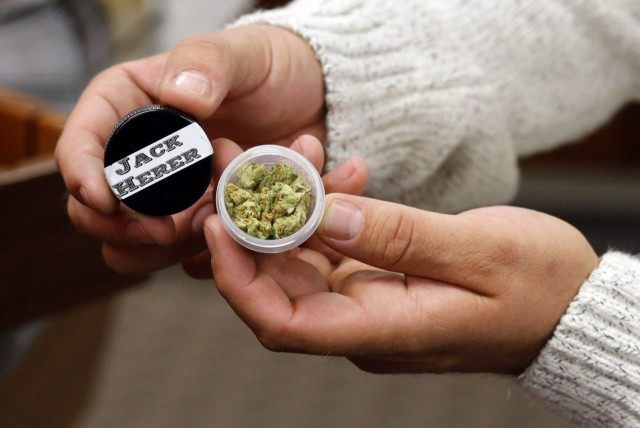TEL AVIV – American companies are investing in Israeli medical marijuana R&D in an attempt to bring Israel’s extensive cannabis prowess back home, Reuters reported.
The Jewish state has already established itself as a pioneer in high-tech and cutting-edge agriculture, and more and more U.S. firms are now realizing that the country’s expertise has extended to the booming medical marijuana industry, expected to grow to $23 billion in the U.S. by 2020.
According to Saul Kaye, CEO of iCAN, a private cannabis research hub, American companies have invested about $50 million over the past couple of years in licensing Israeli medical marijuana patents, cannabis agro-tech startups, and companies developing delivery devices such as inhalers.
“I expect it to grow to $100 million in the coming year,” Kaye said at iCAN’s CannaTech conference in Tel Aviv this month, a large gathering of medical marijuana experts.
In the United States, cannabis R&D is restricted by draconian regulations set by the Drug Enforcement Administration. Even though use of the drug for medical purposes is permitted in 23 U.S. states, and its recreational use is allowed in another four, marijuana is still classified at the federal level as a dangerous narcotic with no medicinal value.
“In the United States, it’s easier to study heroin than marijuana,” said U.S. psychiatrist Suzanne Sisley, Director of Medicinal Plant Research at Heliospectra.
“With marijuana you have to go through added layers of government red tape. It highlights the way marijuana research is being shackled by politics,” said Sisley, who has led research into the effects of cannabis as a treatment for American military veterans suffering from Post-Traumatic Stress Disorder.
Jeffrey Friedland, CEO of private U.S. investment firm Friedland Global Capital, has invested in two agro-tech companies and a pharmaceutical firm in Israel.
“Israel is a leader in agriculture, take that and couple it with research – you have the two sides, plant science and pharmaceutical development,” Friedland said.
“If you’re in California or Colorado, you’re getting medical marijuana in a lot of cases from someone who did not graduate high-school – there’s no science.”
In Israel, recreational use of the drug is still illegal. Only 23,000 people have Health Ministry permits to purchase medical cannabis from nine licensed suppliers.
However, Israeli authorities are far more relaxed when it comes to research of the drug. Growers work in tandem with scientific institutions to develop cannabis strains that treat a range of illnesses.
Israeli Health Minister Yakov Litzman, an ultra-Orthodox Jew, supports the usage of medical cannabis and has introduced measures to ease procurement of prescriptions.
In a clinic in Tel Aviv, 65-year-old Noa lights a joint. She suffers from fibromyalgia, a chronic pain disorder, and explains how six months of smoking medical cannabis has transformed her life.
“I can function again. Most importantly, I’m a grandma, I can roll around on the floor with the kids,” she told Reuters.
The clinic belongs to Tikun Olam, Israel’s largest medical marijuana supplier, which partnered with a private U.S. investment group earlier in the year to grow medical marijuana in four U.S. states.
Tikun Olam is also taking part in clinical trials on epilepsy, Crohn’s disease, spasticity, and tinnitus, said Zvi Bentowich, its chief scientist.
Professor Raphael Mechoulam of the Hebrew University in Jerusalem praised the Israeli government’s liberal attitude toward the research.
“Cannabinoid research was and still is viewed positively by government committees,” he said, adding that law enforcement was not involved in study approval.
Professor Mechoulam is credited with discovering THC, marijuana’s main psychoactive ingredient, in the 1960s.
American investors are also claiming that you get more bang for your buck in Israel.
“What you would spend half a million dollars on in the U.S. you could easily get for $125-150,000 in Israel and it’s going to be done efficiently and on time. The quality of research is world-class and the arbitrage of value is good,” said Seth Yakatan, CEO of California-based Kalytera Therapeutics.

COMMENTS
Please let us know if you're having issues with commenting.